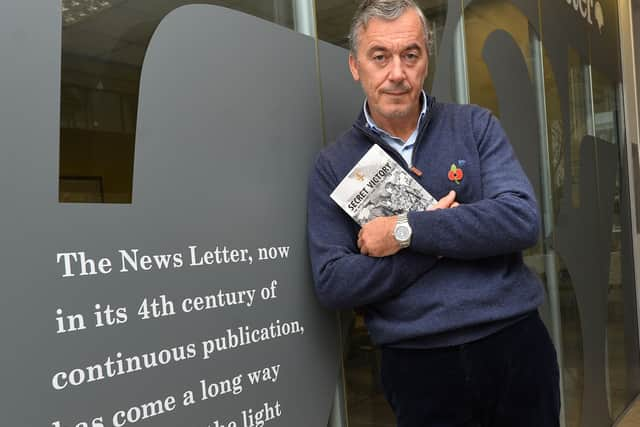William Matchett: ‘Collusion – probably the best fake news story in the world’


This healthy scepticism is spectacularly missing in the legacy of Northern Ireland’s past.
For the 50th anniversary of the start of the Troubles 12 hours by the national broadcaster. Although the top security experts were chief constables like Sir Ken Newman and Sir John Hermon, their strategic view was not transmitted.
Advertisement
Hide AdAdvertisement
Hide AdWhat aired excluded the security element of a government strategy led by police and steered by police intelligence for nearly all of the Troubles.


Predictably, therefore, the cop most heard, John Stevens, was not of the Newman/Hermon mindset. To read his book, clearly, he believes the Bogside could have been policed like Basingstoke.
Not having charged intelligence personnel for the 1989 loyalist murder of Patrick Finucane, Cambridgeshire’s senior bobby used a vague collusion term. In 2003 he gave the Public Prosecution Service some half a billion words. The reply, four years later, stated the obvious, instructing collusion is not crime. Of real crime the huge file lacked evidence to prosecute intelligence personnel.
A gripping read in parts, no doubt. But so is Alice in Wonderland.
Advertisement
Hide AdAdvertisement
Hide AdHealthy media scepticism should have asked: Why did a criminal investigation of enormous length and public cost invent non-crime?
No such question came because collusion as a story can run and run and run.
It ticks so many boxes.
• Human interest: corruption, secrecy and conspiracy theory.
• Politics: Provo republicanism’s hatred of ‘Brits,’ factional unionism, hard left, bleeding heart liberals, Dublin co-ethnic bias and London disinterest.
• Economics: law firms and so-called human rights groups.
• Academia: utopian theories of security and justice.
Advertisement
Hide AdAdvertisement
Hide AdAll donate to and benefit from the biggest tick box — blame. Or rather, demonising the security forces and security effort, especially intelligence.
Politics created a due diligence-free zone where narrative reigns.
These collusion findings, that the public believe, are based on evidence that has not stood up to scrutiny in a criminal court. This approach to reports that ruin reputations but do not meet the criminal burden of proof continued with the Police Ombudsman’s office, until collusion was recently described as “opinion” in an ongoing legal action.
Any such contrary finding is often ignored, by the media, who invite people on to give their own opinion, as the comeback cameo on screen by Stevens, now a lord, shows.
Advertisement
Hide AdAdvertisement
Hide AdBolstering the ranks of opinion formers, more views are sought from former terrorists untouched by remorse.
UDA leader Johnny Adair, PIRA diehard Tommy McKearney and UVF killer Laurence Maguire.
Three times zero is still zero (setting aside the gutter morality of convicted terrorists being given a platform to badmouth security forces, predominantly police, who put them in prison).
To be clear, there was some fine work done by the local Spotlight team where journalism did not meander into innuendo, hearsay or opinion.
Advertisement
Hide AdAdvertisement
Hide AdFor example, Jennifer O’Leary’s excellent exposé of ex-priest and ex-Provo Patrick Ryan was based on his own testimony of his own actions and motivations.
But there were huge problems in parts of the 50th anniversary BBC series. In the opening Peter Taylor documentary, the tragic tale of John Boyle in 1978 was told. An innocent boy shot dead by the SAS at a munitions hide. The implication could have been that the SAS killed many innocent Catholic civilians, took no prisoners and the police paid no heed.
It did not explain that police investigated the Boyle killing, prosecuting two SAS soldiers for murder. Both stood trial and were acquitted.
Over 25 years the special forces killed four innocent civilians (two Catholics and two Protestants).
Advertisement
Hide AdAdvertisement
Hide AdAs to a shoot-to-kill policy, I count seven incidents in the Troubles in which the SAS arrested 15 people (from a terrorist gun team in 1980 to a terrorist sniper team in 1997).
The latter were ideal candidates if there had been shoot to kill. Yet, they ended up in handcuffs, not body bags. Special forces deployed when the risk was highest.
Eight were killed in tackling the world’s deadliest terrorists. The norm, however, was cops confronting terrorist suspects, resulting in a 99% arrest rate.
But to show operational security in this light is to show its rule of law framework, which does not fit the collusion story typified in the televised history of the Troubles.
Advertisement
Hide AdAdvertisement
Hide AdThe collusion narrative is based on selective of partial accounts and opinion, rather than rather than evidence of a prosecutorial standard.
Even Carlsberg would struggle to beat this one-sided in anywhere else with a free press.
• William Matchett is an ex Special Branch inspector and author of Secret Victory: The Intelligence War that Beat the IRA. He is Adjunct Fellow at the Edward M Kennedy Institute for conflict prevention, Maynooth University, Ireland